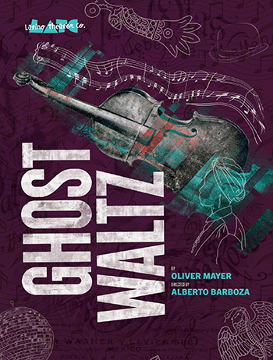BRINGING BACK ROSAS’ BLOOM
The inaugural presentation of the Latino Theater Company‘s 2024 season, Ghost Waltz stands as a testament to the company’s commitment to groundbreaking theatrical endeavors. Commissioned by the company, penned by local playwright Oliver Mayer and deftly helmed by director Alberto Barboza, this production transcends mere entertainment, serving as an enlightening exploration into the life of Juventino Rosas (1868 – 1894), a Mexican-Otomà composer of salon music who wrote his most famous piece, the lovely Viennese-style waltz “Sobre las Olas” (or “Over the Waves”) not long before passing at 26 of spinal myelitis. You’ve no doubt heard this catchy waltz — often misattributed to Johann Strauss Jr. — from Mario Lanza, during a circus or magic show, or even in Mary Poppins when Bert imitates a high-wire act.
Eduardo Robledo and Quetzal Guerrero
Rosas had an enormous reach and influence (as he was in turn no doubt influenced by Strauss) but except for an eponymous 1933 Mexican biopic and a 2002 biography Juventino Rosas: His Life, His Work, His Time, there is a clear division between legends and facts, of which there aren’t many aside from his musical life. Bringing light to Rosas’s life and contributions, Mr. Mayer isn’t interested in a straightforward reinvention of his life, but offers an examination of why Rosas was tossed to the scrap heap of other unknown “great melodists.” Thus, his context — as with most contemporary Latino playwrights — is suffused with elements of magical realism, incorporating fantastical Day-of-the-Dead elements into a narrative that, at times, is also realistic.
Ariel Brown and Monte Escalante
The setting, a meticulously crafted representation of the late nineteenth-century Mexican and American societies, provides a rich canvas upon which the narrative artfully depicts the adversities and achievements of people of color during a transformative epoch.
Cástulo Guerra and Eduardo Robledo
The narrative commences with the depiction of a youthful Juventino Rosas, embodied by the virtuosic violinist and thespian Quetzal Guerrero, who, alongside his father, portrayed by Eduardo Robledo, ventures to Mexico City to subsist as itinerant musicians. The demise of his father precipitates a poignant shift in Rosa’s odyssey, capturing the attention of pedagogues at the Conservatory and propelling him towards a fortuitous juncture to refine his talents in classical music and composition. His ascendant career escorts him to the United States, where he encounters the ragtime luminary Scott Joplin, incarnated by the magnetic jazz pianist and actor Ric’key Pageot, traversing cities imbued with a rich musical heritage, such as Chicago and New Orleans.
Cástulo Guerra and Quetzal Guerrero
With the magical realism comes moments laden with poignancy, accentuating the indomitable spirit and inventiveness of its central figure. The characters orbiting Rosas contribute layers of complexity and vibrancy to the tale, exemplified by the “Mexican Nightingale” Ãngela Peralta, whose operatic renditions, delivered by Dominican opera singer Nathalie Peña-Comas, captivate the assemblage and evoke the intricate cultural mosaic of the period. The inclusion of the historical figure Marie Leveau, a voodoo practitioner portrayed by Monte Escalante, infuses the plot with themes of fate and supernatural influence, enriching the narrative tapestry.
Quetzal Guerrero, Nathalie Peña-Comas, and Monte Escalante
The ensemble’s synergy is tangible upon the stage, with committed performances that imbue each role with verisimilitude and profound sentiment. The incorporation of live music, with instruments such as violins, guitars, and accordions, not only augments the storyline but also ensconces the spectators in a bygone era, permitting them to partake in the music as it harmonizes with the unfolding tableau.
Eduardo Robledo, Ariel Brown, Quetzal Guerrero and Ric’key Pageot
The production’s aesthetic elements are equally commendable. The scenic and costume designs by Emily Anne MacDonald and Cameron Jaye Mock adeptly metamorphose the Los Angeles Theatre Center‘s venue into an enthralling milieu that mirrors the grandeur and ethos of the time. The auditory landscape crafted by Nathan Davis and the illumination by Johnny Garofalo further intensify the play’s ambiance, crafting an experience that is both vivid and engrossing.
Quetzal Guerrero, Nathalie Peña-Comas, and Ric’key Pageot
Ghost Waltz is an ode to cultural heritage, the inclusivity of diversity, and the transcendent nature of music in surmounting societal confines. It beckons a diverse array of spectators, from aficionados of historical chronicles to music connoisseurs, and those enthralled by narratives of human tenacity and creative breakthroughs. This production not only spotlights the invaluable contributions of Latino and Black artists to our cultural fabric but also fosters a profound recognition and comprehension of their pivotal, albeit frequently unacknowledged, influence on the tapestry of global culture.
photos by Grettel Cortes Photography
Ghost Waltz
Latino Theater Company
in association with Chicago’s UrbanTheater Company
Los Angeles Theatre Center, 514 S. Spring St.
ends on May 28, 2023
Thurs-Sat at 8; Sun at 4
for tickets, call 213.489.0994 or visit LATC
parking $8 with box office validation at Los Angeles Garage Associate Parking structure,
545 S. Main St. (between 5th and 6th Streets, just behind the theater)

